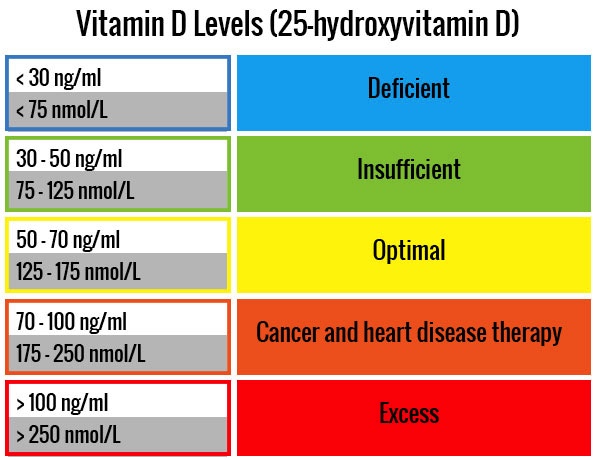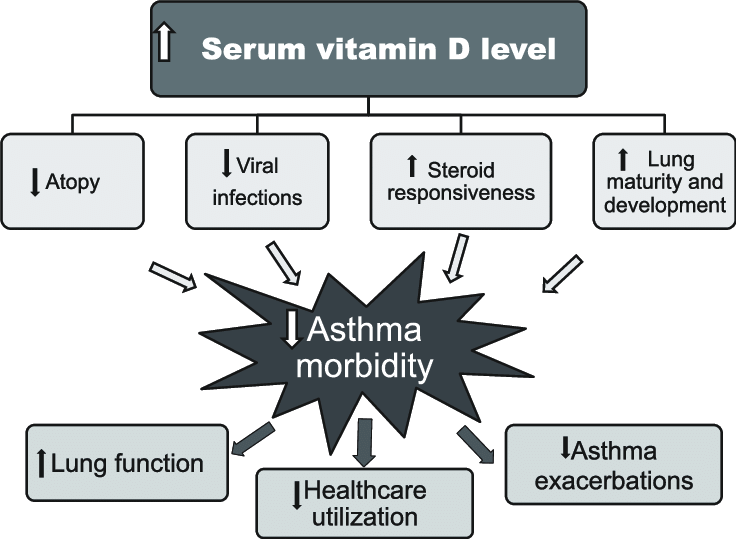
As mentioned in this author’s last post, emerging evidence has suggested that nutrition, or lack thereof, has been implicated with asthma signs, symptoms, and underlying inflammation.1 Currently, most patients do not receive optimal asthmatic control despite high dose treatments of medications.2 Such outcomes behoove medical and nutrition professionals to consider adjunct therapies, at minimum, to help support the health of said individuals. The following will consider vitamin D, its relationship to asthma, and research indicating its utility in supporting lung function and health.

Wang et al2(85) indicated that multiple epidemiological studies produced strong associations between vitamin D deficiency, defined as 25-hydroxyvitamin D (25OHD) levels below 30 ng/ml, and increased incidences of asthma. Furthermore, said findings were especially present amongst individuals who had uncontrolled/severe asthmatic episodes.2(85) As such, the researchers postulated that 25OHD played a role in modulating the immune response, a defining characteristic of asthma, by its anti-inflammatory effects.2(85)

Wang et al2(86) conducted a meta-analysis of randomized trials exploring the effects of vitamin D supplementation upon asthmatics and associated lung function. Inclusion criteria when selecting studies was as follows: randomized controlled trials (RCTs), the rate of adverse events, intervention was vitamin D, participants were diagnosed with asthma, outcomes were reported in predicted percentage of forced expiratory volume (FEV1) in first second, the rate of asthma exacerbation, fractional exhaled nitric oxide (FENO), asthma control test scores (ACTS), and interleukin-10 (IL-10) levels. After considering said inclusion criteria, 14 studies remained for analysis. 2(86)

The meta-analysis indicated that vitamin D supplementation had no association with FEV1 (volume of air forced out of the lungs in one second), ACTS (numerical self-score identifying degree of asthma control), FENO (measures nitric oxide; a substance used to manage the presence of inflammation), IL-10 (manages the presence of inflammation), or the rate of adverse events.2(91) Despite an apparent lack of amelioration of signs and symptoms, vitamin D supplementation did produce other favorable effects. The following will consider the same.

The metal-analysis of Wang et al2(91) did suggest that vitamin D supplementation positively affected asthmatic parameters within a specific group of patients; individuals who were vitamin D insufficient at baseline. Subgroup analysis, using the Endocrine Society’s definition of vitamin D insufficiency/deficiency as 25OHD concentrations of <30 ng/ml, indicated that such patients experienced positive effects of vitamin D supplementation to include a lower rate of exacerbation (acute episodes of shortness of breath, wheezing, coughing).2(91)

The evidence from Wang et al2(92) does support the use of vitamin D supplementation, especially amongst 25OHD deficient patients. Such conclusions are further supported by pre-existing knowledge that vitamin D interfaces with cells of the adaptive and innate immune systems, in addition to cells within the airways.2(92) Furthermore, 25OHD deficiency allows for and promotes inflammation, and rectifying deficiencies helps control such effects.
In conclusion, most asthmatic patients do not receive optimal control of symptoms despite high dose treatments of medications. Such outcomes behoove medical and nutrition professionals to consider adjunct therapies, at minimum, to help support the health of said individuals. As part of a complete and inclusive intervention, consideration of 25OHD levels, and supplementation when and where indicated, could help manage symptoms and underlying causes of asthma.
References
1. Abubat F, AlAwan A, Masuadi E, et al. The role of magnesium supplements for the management of stable bronchial asthma: A systematic review and meta-analysis. NPJ Prim Care Respir Med. 2019;29(1):1-8. doi:10.1038/s41533-019-0116-z.
2. Wang M, Liu M, Xiao Y, et al. Association between vitamin D status and asthma control: A meta-analysis of randomized trials. Respir Med. 2019;150:85-94. doi:10.1016/j.rmed.2019.02.016.
-Michael McIsaac
